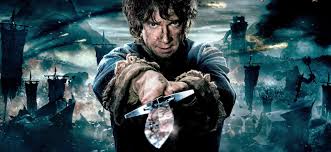Thirteen years after first transporting us to Middle Earth, Peter Jackson delivers the final chapter of his Tolkien saga, closing out an uneven Hobbit trilogy with its leanest and most satisfying installment. Although it never quiet reaches the heights of The Lord of Rings, Battle of the Five Armies mostly succeeds in its tasks, providing the finale for Bilbo and the Dwarves’ adventure, setting up the events to come and reminding us once more of the fun to be had when we visit Middle Earth in Jackson’s company.
Five Armies picks up events precisely where The Desolation of Smaug left them, as the residents of Lake Town brace themselves as Smaug bears down on the town. The fiery destruction and struggle that follows is impressively spectacular and, with the other plot threads interwoven in the action, the viewer is immediately thrown back into the action. There are no tea-parties or sing-a-longs here and with no time spent catching viewers up, a repeat viewing of the last film is advised in advance.
From here, Thorin (Richard Armitage) and his increasing descent into “dragon sickness” drive events, culminating with a handful of armies and the battle promised in the title. Although little more than posturing, arguing and politicking, there is enough substance and drama to keep the viewers attention, particularly delivered in the arc of Thorin and Bard (Luke Evans). The final hour of the running time is consumed by the titular battle, with Jackson having lost none of his talent for large-scale mayhem and imagination. With Elves, Orcs, Men, Dwarves and all manner of steed descending on Erebor there is a risk that the viewer may get lost or, worse, bored by the carnage. However, Jackson inter-cuts the action with moments of humour, tragedy and tenderness so our attention never slips.
The film is not without problems, the largest being the continued peripheral role played by Bilbo. Martin Freeman has excelled with the little he has had to do throughout the series, which makes his demotion to bit part all the more of a shame. The romantic subplot continues to miss the mark, having the feel of being shoe-horned in and failing to make this reviewer care very much. Lastly, the shortest of the trilogy, the film has at times a feeling of being rushed, in particular one thread involving major characters from the Lord of The Rings. Why deny us now as this final hurdle with a rushed conclusion?
And so we bid farewell to Middle Earth for the last time. The trio of Hobbit films undoubtedly pale in comparison to what preceded them, however they have, at times at least, reminded us why we fell in love with Middle Earth in the first place. This was never truer than in The Battle Of The Five Armies, the strongest film of this trilogy and a suitable cap to the entire series.

